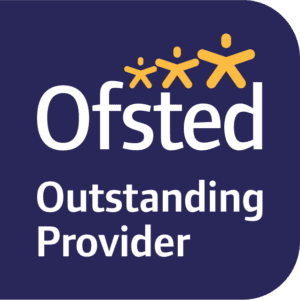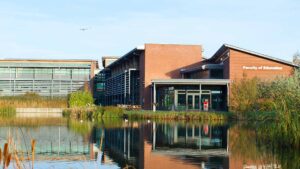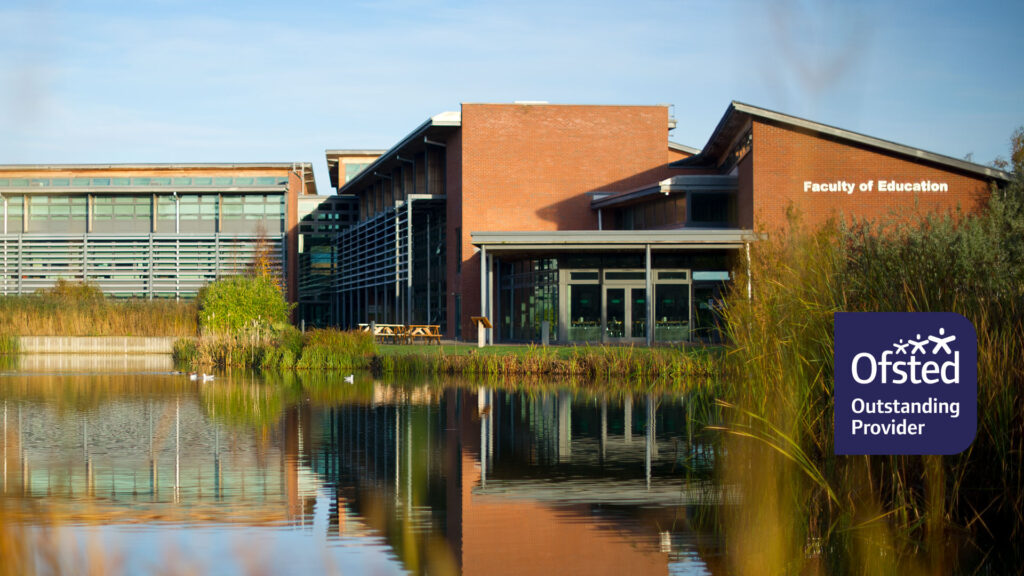Secondary Computing with QTS (11-16) PGCE
GOV.UK code: Q549
Inspire a digital generation. Build enthusiasm for IT. Train to teach computing to 11-16 year-olds, and help unlock their technical creativity. On completion of this course, you’ll gain recommendation for Qualified Teacher Status (QTS).
Overview
| Course length: | 1 year full-time |
|---|---|
| Start dates: | September 2024 September 2025 |
| Location: | Edge Hill University |
| Subject(s): | Education and Teaching |
| Faculty: | Education |
| Department: | Secondary and Further Education |

Young people are growing up in a world where digital literacy is vital in all aspects of their lives. Starting to learn these skills at school is essential to set them up for success, whatever they decide to do in the future.
With a new focus on the subject in schools and a resurgent interest in computer technology like the Raspberry Pi and Codebug, there’s no better time to train as a teacher of computing. You’ll learn to teach all aspects of computing, from computer science and digital literacy to information technology. And you’ll get to use the latest specialist software and tools.
How do you create a lesson plan to inspire and motivate your pupils? What are the current challenges in secondary education? How do you pass on your computer science expertise – and continue to grow that knowledge throughout your career? You’ll explore a range of questions to help you become the best teacher you can be.
Learn to lead in the classroom
You’ll develop your reflective and analytical skills, as well as boosting your own subject knowledge. To prepare for teaching computing at key stage 3 and 4, you’ll also get lots of hands-on experience in the classroom.
During your placement, you’ll work alongside your computing tutor and school-based mentor. They’ll help you apply your university learning to your own teaching and be there for you whenever you need support.
Successful completion of the programme leads to a recommendation for Qualified Teacher Status (QTS).
Subject knowledge enhancement
If you need to develop your computing subject knowledge or it has been some time since you last studied computing, then our free subject knowledge enhancement course will prepare you for teaching the conceptual and applied aspects of computing effectively to learners aged 11-16 years.

Course features
-
Ofsted outstanding provider for Initial Teacher Education
-
Professional accreditation
-
Professional practice placements
-
International students can apply
What you'll study
At the start of your course you will complete an audit of your subject knowledge. This way you can identify your areas of strength and those you need to develop.
You’ll study the computing curriculum, including software used in schools, educational theory, as well as innovative teaching and assessment methods. Discover how to plan a lesson effectively and how to incorporate lively, interactive techniques to help your students develop confidence and self-esteem.
You’ll also build on your subject knowledge in a range of areas, including programming, computational thinking, applications and database design. We’ll also cover multimedia, spreadsheet modelling, web authoring, desktop publishing and aspects of computer control.
To prepare for your future as a teacher, you’ll also learn about professional roles and responsibilities, as well as polishing your academic skills.
How you'll study
A combination of academic and technical study, group discussion and reflection, and practical, work-based learning in the classroom will give you all the knowledge and skills you need to become a creative and innovative teacher. The programme aims to develop a reflective and critically analytical approach to education.
You will undertake extensive placements in schools, colleges and other educational settings, putting your training into practice through assisting in and taking responsibility for classes, and working alongside mentors and peers to further your professional development. The focus initially is on observation and supporting teaching and learning. Your teaching timetable will increase as your training progresses and you become more confident and competent in the classroom.
How you'll be assessed
You will be assessed, through a balanced combination of coursework and portfolio assessments, against both academic criteria and the standards related to QTS. Various other tasks will enable you to show your competence in computer science and information technology, including creating an interactive teaching pack and undertaking action-based research.
Your professional practice will conclude with a final viva that will allow you to demonstrate appropriate achievement against the Teachers’ Standards in order to allow us to make a recommendation for QTS.
Who will be teaching you
The Faculty of Education has been at the forefront of teacher education for over 135 years and today enjoys the enviable position of being one of the country’s leading providers of education, training and research for the children’s workforce.
The programme is managed and developed by a team of experienced tutors all of whom have experience of teaching in schools.
Entry criteria
Entry requirements
To join this PGCE, you will be expected to have:
- A degree equivalent to UK first-class or second-class honours (2:2 or above) in a relevant subject. Other subjects may be considered if you have a relevant A Level (or equivalent qualification) and a willingness to engage in subject knowledge enhancement
- GCSE English Language or English Literature and GCSE Mathematics at Grade C or Grade 4 or above (or equivalent qualification)
- Satisfactory levels of Information and Communications Technology competence
- A commitment to, and understanding of, secondary education, demonstrating the personal attributes, values and motivation required to train as a teacher.
Please note, for the purposes of initial teacher training, level 2 literacy and numeracy qualifications are not considered as equivalent to GCSE Grade C or Grade 4 in English Language or English Literature and Mathematics.
An interview forms part of the selection process, which can be conducted online or face to face.
If you accept a formal offer from Edge Hill University you will be required to meet the Department for Education’s standards for physical and mental fitness to teach and clearance to work with children. Further information, including a Declaration of Health questionnaire and details of how to apply for a Disclosure and Barring Service (DBS) Enhanced Disclosure will be sent to you after you have firmly accepted an offer.
English language requirements
International students require IELTS 6.5, with a score no lower than 6.0 in each individual component, or an equivalent English language qualification.
If your current level of English is half a band, one band, or one-and-a-half bands lower, either overall or in one or two elements, you may want to consider our Pre-Sessional English course.
How to apply
Apply full-time
Read our guide to applying for PGCEs and Postgraduate Teacher Training to find out more about the application process.
International
Please see our international student pages for further information about how to apply as a prospective international student.
Should you accept an offer of a place to study with us and formally enrol as a student, you will be subject to the provisions of the regulations, rules, codes, conditions and policies which apply to our students. These are available at www.edgehill.ac.uk/studentterms.
There’s plenty of opportunities to come take a look around campus. Attend one of our open days to see what life at Edge Hill University is all about.
Book an open day
Facilities
 Housed in a state-of-the-art £9million building, the Faculty of Education enjoys a stunning setting from both its lakeside and piazza buildings.
Housed in a state-of-the-art £9million building, the Faculty of Education enjoys a stunning setting from both its lakeside and piazza buildings.
Facilities in the lakeside building include a 300-seat lecture theatre, five well-equipped ICT suites, and 18 teaching rooms complete with the latest technology. The lakeside building is also home to a popular vegan and vegetarian cafe where students can meet to socialise and discuss their studies.
The nearby piazza building offers modern facilities including a lecture theatre and a number of seminar rooms.
Where you'll study
Faculty of Education
Finance
Tuition fees
UK Full-Time
£9,250
for the course
International
£16,500
for the course
EU/EEA and Swiss students who have settled or pre-settled status under the EU Settlement Scheme, as well as Irish nationals, may be eligible for the UK tuition fee rate.
Financial support
Subject to eligibility, UK students joining this course can apply for a Tuition Fee Loan from the Government to cover the full cost of tuition fees. UK students enrolling on the course may also be eligible to apply for additional funding to help with living costs. If you are a UK student joining this PGCE in academic year 2023/24, you may be eligible to receive a Department for Education bursary worth £27,000 if you have a first class, 2:1 or 2:2 honours degree or have successfully completed a PhD or Masters award. Please view the relevant Money Matters guide for comprehensive information about the financial support available to eligible UK students.
Subject to eligibility, UK students joining this course can apply for a Tuition Fee Loan from the Government to cover the full cost of tuition fees. UK students enrolling on the course may also be eligible to apply for additional maintenance loan funding to help with living costs. Please view the relevant Money Matters guide for comprehensive information about the financial support available to eligible UK students, together with details of how to apply for potential funding.
EU/EEA and Swiss students who have settled or pre-settled status under the EU Settlement Scheme may be eligible to apply for financial support. Irish nationals can ordinarily apply to Student Universal Support Ireland (SUSI). If you are an EU student who does not have settled or pre-settled status, or are an international student from a non-EU country, please see our international student finance pages.
Your future career
This PGCE is accredited by the Department for Education. Successful completion of the programme will enable you to gain recommendation for Qualified Teacher Status (QTS).
You’ll be ready to progress into employment as an early career teacher of computer science at secondary school level. Our proactive careers service can help you to find job vacancies. They also offer in-depth advice on teacher job applications and interviews.
Your academic and professional experience will also mean you could progress onto MA or MRes study. After that, you might even decide to work towards your PhD.
Course changes
Every effort has been made to ensure the accuracy of this information, however our courses are subject to ongoing review and development. Changing circumstances may necessitate alteration to, or the cancellation of, courses.
Changes may be necessary to comply with the requirements of professional bodies, revisions to subject benchmarks statements, to keep courses updated and contemporary, or as a result of student feedback. We reserve the right to make variations if we consider such action to be necessary or in the best interests of students.











